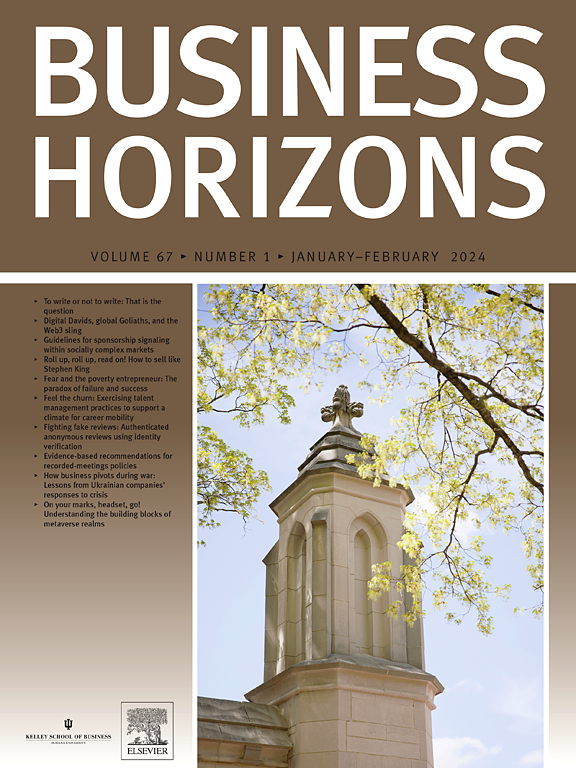跨国企业子公司的和平建设:无形资本和地方倡议的作用
IF 7
3区 管理学
Q1 BUSINESS
引用次数: 0
摘要
本文讨论了跨国企业(MNE)的无形附属资本如何影响在冲突地区开展业务的子公司的建设和平活动。无形附属资本包括多国企业国外子公司中的人力资本、社会资本和组织资本。我认为,这些形式的资本代表着无形资产,使子公司能够为冲突地区的和平做出贡献。它们通过促进随着时间推移而展开的和平倡议创造和执行过程来实现这一目标。这一过程类似于跨国企业子公司中广泛存在的创业倡议。正如文献所记载的那样,这一过程因其人道主义目的而不同于子公司的举措。本文提出的方法为分析跨国企业子公司的和平建设提供了一种新方法,同时也为子公司倡议文献在冲突频发的世界中赋予了新的目的。本文对跨国企业管理的启示包括,在冲突地区开展业务的子公司需要了解和发展不同类型的无形附属资本,从而能够发现并成功寻求当地的和平建设机会。本文章由计算机程序翻译,如有差异,请以英文原文为准。
Peacebuilding by MNE subsidiaries: The role of intangible capital and local initiative
This article discusses how intangible subsidiary capital in multinational enterprises (MNEs) influences peacebuilding activities by subsidiaries operating in conflict zones. Intangible subsidiary capital includes human, social, and organizational capital that resides in the foreign subsidiaries of MNEs. I argue that these forms of capital represent intangible assets that enable the subsidiary to contribute to peace in conflict zones. They do this by facilitating a process of peace-initiative creation and execution that unfolds over time. This process is similar to entrepreneurial initative that is widely observed in subsidiaries of MNEs. The process differs from that of subsidiary initiatives due to its humanitarian purpose, as documented in the literature. The approach developed in this article provides a new way to analyze MNE subsidiary peacebuilding while giving the subsidiary initiative literature a new purpose in a conflict-ridden world. Implications for MNE management include the need to both understand and develop the different types of intangible subsidiary capital in subsidiaries operating in conflict zones so that local opportunities for peacebuilding can be identified and pursued successfully.
求助全文
通过发布文献求助,成功后即可免费获取论文全文。
去求助
来源期刊

Business Horizons
BUSINESS-
CiteScore
17.70
自引率
5.40%
发文量
105
期刊介绍:
Business Horizons, the bimonthly journal of the Kelley School of Business at Indiana University, is dedicated to publishing original articles that appeal to both business academics and practitioners. Our editorial focus is on covering a diverse array of topics within the broader field of business, with a particular emphasis on identifying critical business issues and proposing practical solutions. Our goal is to inspire readers to approach business practices from new and innovative perspectives. Business Horizons occupies a distinctive position among business publications by offering articles that strike a balance between academic rigor and practical relevance. As such, our articles are grounded in scholarly research yet presented in a clear and accessible format, making them relevant to a broad audience within the business community.
 求助内容:
求助内容: 应助结果提醒方式:
应助结果提醒方式:


